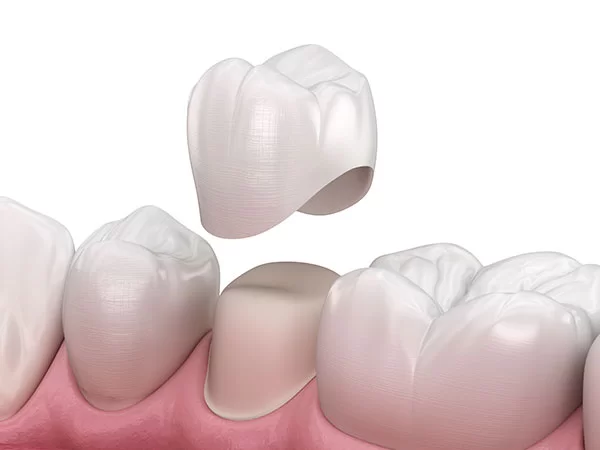Know When to Visit the Dentist for a Dental Crown
Dental crowns are one of the most common restorative procedures, offering a reliable solution for damaged, decayed, or weakened teeth. Whether you’re dealing with a cracked tooth, severe tooth decay, or cosmetic concerns, dental crowns can restore your smile’s functionality and appearance. If you’re in Holyoke, MA, or nearby areas like Westfield, South Hadley, or Springfield, recognizing the signs you need a dental crown is the first step toward better oral health.
Dr. Eric Chen, a trusted dentist in Holyoke, MA, is here to help. Call our Holyoke dental practice at (413) 538-7400 to schedule a consultation and learn how dental crowns can benefit you.
Do You Need a Dental Crown? Key Signs to Watch For
Severe Tooth Decay or Advanced Cavities
When tooth decay progresses beyond what a simple dental filling can repair, a dental crown becomes essential. Signs include:
- Persistent toothaches or sensitivity to hot or cold foods.
- Visible dark spots, holes, or pits on the tooth surface.
- Weak tooth structure that risks further damage.
A dental crown protects the damaged or decayed tooth, restoring its strength and preventing additional issues.
Cracked, Broken, or Fractured Teeth
Accidents, trauma, or even teeth grinding can lead to cracked or broken teeth. Look for:
- Pain when chewing or biting down.
- Sensitivity to temperature changes.
- Visible cracks or rough edges that irritate your tongue or cheeks.
A crown stabilizes the tooth, prevents further damage, and restores its natural appearance.
Large or Failing Dental Fillings
If you have a tooth with a large dental filling, it may weaken over time. Signs you need a crown include:
- A dislodged, cracked, or deteriorating filling.
- Increased sensitivity to hot or cold.
- Risk of further damage to the tooth structure.
A dental crown provides better protection than a filling alone, ensuring long-term durability.
After Root Canal Treatment
A root canal-treated tooth often requires a crown to restore its strength and protect it from future damage. Without a crown, the treated tooth may become brittle and prone to fractures.
Misshapen, Stained, or Discolored Teeth
If you’re unhappy with the appearance of your teeth due to severe staining, discoloration, or misshapen teeth, dental crowns offer a cosmetic solution. They can improve the shape, size, and color of your teeth for a natural, uniform smile.
Tooth Grinding (Bruxism)
Persistent teeth grinding can wear down your teeth, leading to:
- Flattened or uneven tooth surfaces.
- Jaw pain or headaches.
- Loose or mobile teeth.
Dental crowns restore the tooth’s structure and protect against further damage caused by grinding.
Cracked Enamel or Weak Tooth Structure
If your tooth enamel is cracked or significantly worn, a crown can shield the tooth from further damage. Signs include:
- Visible cracks or lines on the tooth surface.
- Rough or jagged edges causing irritation.
- Discoloration or stains due to enamel damage.
Dental Implants or Bridges
When replacing a missing tooth with a dental implant or dental bridge, crowns are often used to cover the implant post or support the bridge. They ensure a stable, natural-looking replacement that blends seamlessly with your smile.
Types of Dental Crowns: Which One Is Right for You?
Your dentist will recommend the best type of crown based on your needs. Common options include:
- Porcelain Crowns: Ideal for front teeth due to their natural appearance.
- Zirconia Crowns: Durable and translucent, perfect for both front and back teeth.
- Metal Crowns: Extremely strong, often used for out-of-sight molars.
- Porcelain-Fused-to-Metal (PFM) Crowns: A balance of strength and aesthetics.
Dental Crown Factors to Consider
When deciding on a dental crown, consider these key factors to ensure the best outcome for your oral health:
- Longevity: Dental crowns are built to last, but their lifespan varies based on oral hygiene, habits, and materials used. Discuss with your dentist how long different crown types typically last.
- Cost: The price of dental crowns depends on the material, procedure complexity, and location. Talk with your Holyoke dentist about costs and payment plans.
- Appearance: For visible teeth or cosmetic concerns, consider the crown’s look. Porcelain and all-ceramic crowns offer a natural appearance.
- Tooth Preparation: The amount of tooth reshaping needed for a crown can differ. Some cases need minimal preparation, while others require more. Discuss this with your dentist to understand what the dental crown procedure entails.
Frequently Asked Questions
The best dental crown for you depends on several factors, such as your dental issue, the tooth’s location, your aesthetic preferences, and your budget. Porcelain crowns are popular for their natural look, while metal crowns are known for their durability. Porcelain-fused-to-metal (PFM) crowns offer a good mix of strength and appearance. Your dentist will assess your situation and suggest the most suitable crown type for you.
Without a crown, a tooth that requires one may be at higher risk of damage or decay. The longevity of a tooth without a crown depends on factors such as the extent of damage, oral hygiene practices, diet, and habits like teeth grinding.
If a tooth requires a dental crown, but you choose not to get one, several complications may arise. Delaying a crown can lead to further damage, such as cracks, fractures, or even tooth loss. It’s best to address the issue promptly.
Yes, alternative dental treatments are available depending on the specific dental condition. Depending on your situation, alternatives like dental veneers or dental bonding may be options. However, crowns are often the best solution for significant decay or damage. Talk to your dentist so they can assess your needs and recommend the most appropriate treatment option.
Choose Dr. Eric Chen for Dental Crowns in Holyoke, MA
At our Holyoke dental practice, we combine advanced technology with personalized care to deliver exceptional results. Whether you need a crown for a cracked tooth, severe decay, or cosmetic reasons, we’re here to help.
If you’re experiencing any of the signs mentioned above, don’t wait. Contact Dr. Eric Chen at (413) 538-7400 to schedule a consultation. We proudly serve Holyoke, Westfield, South Hadley, and the Greater Springfield area.

